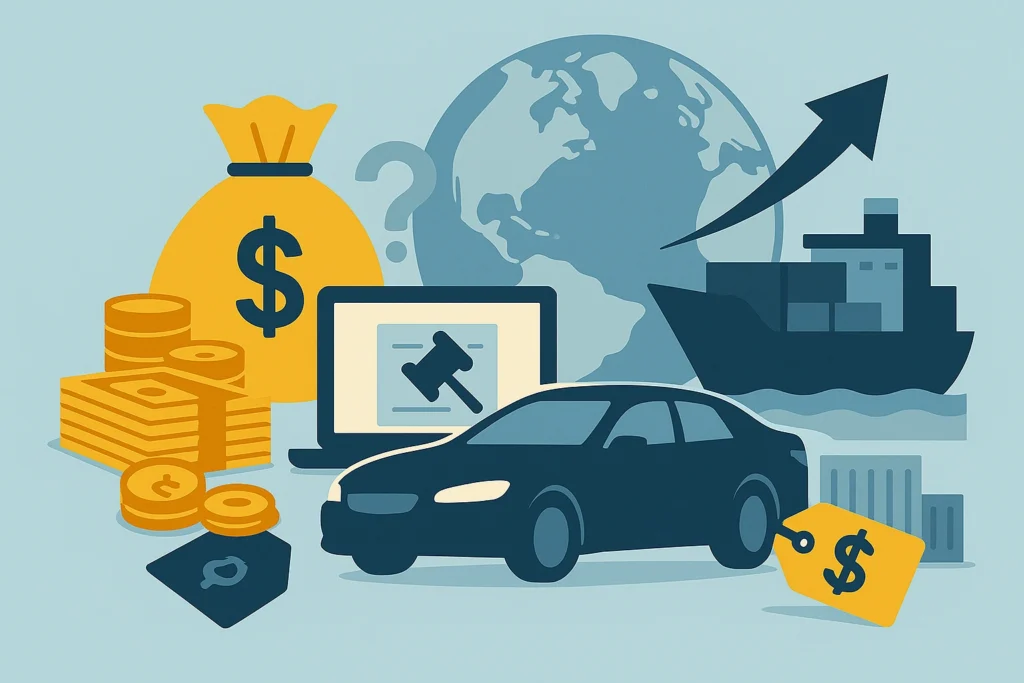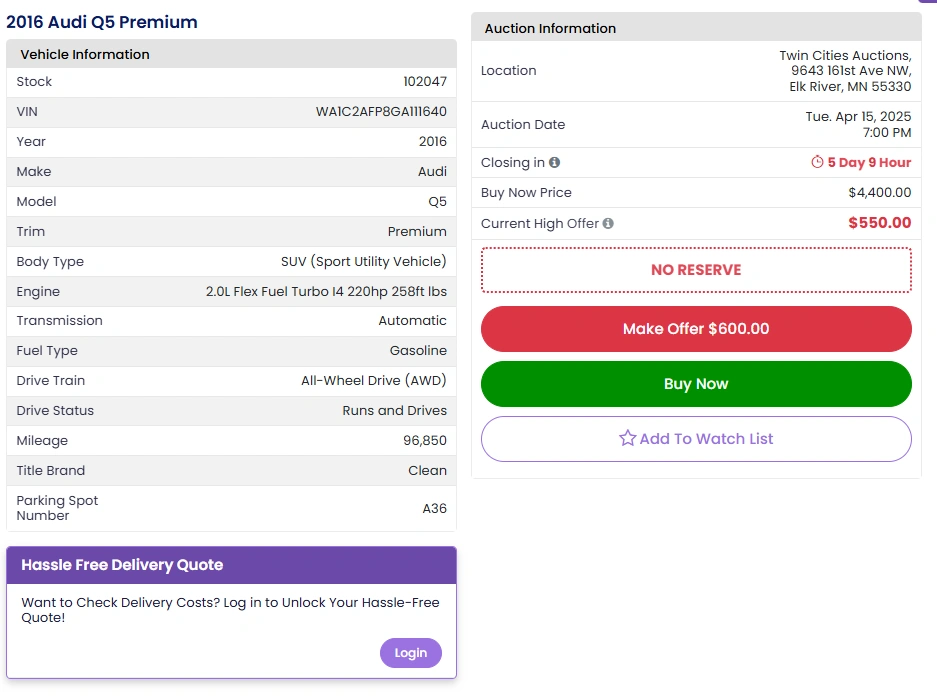Oman’s appetite for imported cars is stronger than ever, bringing in over $2.3 billion of passenger vehicles in 2023 alone. Driven by a burgeoning middle class and sizable expatriate population seeking dependable, modern rides, the
Sultanate presents a lucrative market where savvy U.S. exporters can earn 20–25 percent margins in just months.
Below, you’ll find Oman’s import requirements, cost breakdowns, and preferred shipping routes so you can hit the ground running.

Key Takeaways
- Oman’s passenger vehicle imports reached $2.33 billion in 2023, reflecting strong demand for SUVs and luxury sedans among both local and expatriate buyers.
- Imported vehicles must be left-hand drive, no older than seven years, and comply with Gulf Cooperation Council (GCC) specifications, including emissions and safety standards.
- Importing a vehicle incurs a 5% customs duty and a 5% Value Added Tax (VAT) on the total of the Cost, Insurance, and Freight (CIF) value plus duty.
- Essential import documents include a commercial invoice, bill of lading, import permit from the Ministry of Commerce, and a certificate of conformity from an approved testing center.
- Salalah and Sohar are Oman’s primary ports for vehicle imports, offering modern infrastructure and efficient customs processing according to CruiseMapper
- Sourcing vehicles from reputable U.S. auto auctions can provide access to a wide selection of compliant vehicles at competitive prices, enhancing profit margins.
Understanding the Oman Market
Oman’s used car market is thriving thanks to strong consumer interest in large, durable vehicles suited for desert and city conditions.
SUVs are especially popular among families and off-road enthusiasts, while luxury sedans appeal to the country’s sizable expat population.
American-made vehicles are well-received, especially when they meet GCC specs and offer full service history. Demand is steady year-round, but tends to rise during national holidays and in preparation for Ramadan.
OEC confirms Oman’s 2023 passenger‑car import value at $2.33 billion. Demand centers on SUVs and luxury sedans for both local and expat buyers.
| Metric | Figure |
| Total Import Value (2023) | $2.33 billion |
| Average Annual Growth | ~7 percent |
Source: OEC – The Observatory of Economic Complexity
Regulations and Compliance
Omani authorities strictly enforce vehicle age and specification rules, particularly for private car imports. Vehicles older than seven years are generally barred from import unless they qualify as classic or specialty vehicles.
Left-hand drive is mandatory, and any imported vehicle must meet GCC (Gulf Cooperation Council) standards for emissions, safety, and features such as air conditioning suited to extreme heat.
Before shipment, it’s wise to verify documentation requirements with both customs and the Ministry of Commerce to prevent clearance delays.
Royal Oman Police Customs mandates:
| Requirement | Details |
| Maximum Age (Private Cars) | 7 years |
| Vehicle Type | Left‑hand drive only |
| Emissions & Specs | GCC standard specifications |
| Import Permit | Issued by Ministry of Commerce |
| Certificate of Conformity | From approved testing center |
Source: Royal Oman Police Customs Division
Building Your Landed‑Cost Model
Oman Customs and VAT Authority confirm:
| Cost Item | Rate | Calculation Example (USD) |
| CIF Cost | — | 20,000 |
| Import Duty | 5 percent | 1,000 |
| VAT | 5 percent | (20,000 + 1,000) × 0.05 = 1,050 |
| Miscellaneous Fees | 1 percent | 20,000 × 0.01 = 200 |
| Total Landed | — | 22,250 |
Source: Royal Oman Customs & Oman VAT Authority
Logistics and Shipping Routes
Shipping cars to Oman requires navigating long transit times and coordinating with local agents for customs processing.
Sohar and Salalah are well-equipped ports, offering modern infrastructure and relatively smooth offloading for RoRo and container shipments.
While Salalah is a preferred hub for large shipments from the U.S. West and East Coasts, Sohar offers faster access to Muscat and central Oman.
Exporters should work with experienced freight forwarders to optimize shipping times and reduce delays during peak import seasons.
Maersk schedules confirm typical transit times:
| Route | Transit Time | Port |
| U.S. East Coast → Salalah | 25–30 days | Salalah |
| U.S. Gulf Coast → Sohar | 20–25 days | Sohar |
| U.S. West Coast → Salalah | 30–35 days | Salalah |
Source: Maersk
Financing and Payment Security
International transactions to Oman benefit from clearly defined terms and payment safeguards due to varying buyer profiles.
While open account terms may appeal to repeat customers, they pose higher risks without trade credit insurance.
Letters of credit remain the gold standard for large, first-time shipments and provide legal recourse in case of non-payment.
Escrow arrangements are increasingly popular, especially when buyers want vehicle condition verification before releasing funds.
U.S. EXIM Bank recommends:
| Method | Risk Level | Best Use |
| Letter of Credit | Low | New clients; large shipments |
| Open Account | High | Established, trusted buyers |
| Escrow | Medium | Guarantees delivery before payment |
Source: U.S. Export‑Import Bank
Why Auctions Are a Smart Choice for Car Purchases
Auctions can be an excellent source for late-model vehicles with clear chains of title and affordable pricing. Twin Cities Auctions, based in Minnesota, is one such reputable auction house that offers a wide range of vehicles at competitive prices.
Key Benefits of Buying from Auctions:
- Wide Selection: Auctions like Twin Cities Auctions offer a variety of vehicles, from low-budget cars to high-end models.

- Competitive Pricing: Auctions often offer vehicles at prices below retail value, enabling dealers to maximize their profit margins.

- Transparency: Auctions provide full vehicle history reports, so you know exactly what you’re buying.

- Convenient Bidding: Many auctions offer online bidding for your convenience, making it easier to source vehicles without being physically present.
Twin Cities Auctions: A Smart Vehicle Sourcing Choice
For those in the automotive industry, Twin Cities Auctions offers an excellent platform for sourcing quality vehicles at competitive prices.
Whether you are just starting or expanding your business, this auction house provides transparency, competitive pricing, and a broad selection.
| Feature | Description |
| Inventory Variety | Wide range of cars, trucks, and SUVs available |
| Competitive Pricing | Below-market pricing allows for higher profit margins |
| Vehicle History Reports | Detailed history reports for every vehicle |
| Online Bidding | Convenient online bidding options for dealers |
| Financing Options | Financing available to help with inventory purchases |
Conclusion
Oman’s robust demand for quality used cars creates lucrative opportunities for U.S. exporters. By following confirmed regulations, precisely modeling landed costs, streamlining shipping, and sourcing from trusted auctions, you can secure sustainable profits.
Public Auctions Made Easy with Twin Cities Auctions
At Twin Cities Auctions, we strive to simplify the public auction process for everyone. You don’t need a dealer license to buy or sell cars here. Our online auctions are designed to be user-friendly and open to the public, ensuring that individuals of all experience levels—from novice buyers to experienced sellers—can participate with ease.
With a focus on transparency and ease of use, we provide all the tools and support you need to confidently participate in the auction process. Start your car buying or selling journey with us today and experience how straightforward and effective our auction system can be!
Looking for more options? Explore our comprehensive list of all available car auctions across the United States. Your next deal might be just a click away!
FAQ
What are Oman’s auto import duties?
Import duty is 5 percent of CIF value.
What VAT applies?
VAT is 5 percent on CIF plus duty.
What age limit applies?
Private cars must be 7 years old or newer.
How long does customs clearance take?
Typically 5–7 business days with full documentation.
Are emissions tests mandatory?
Yes—vehicles must meet GCC standard specifications.


